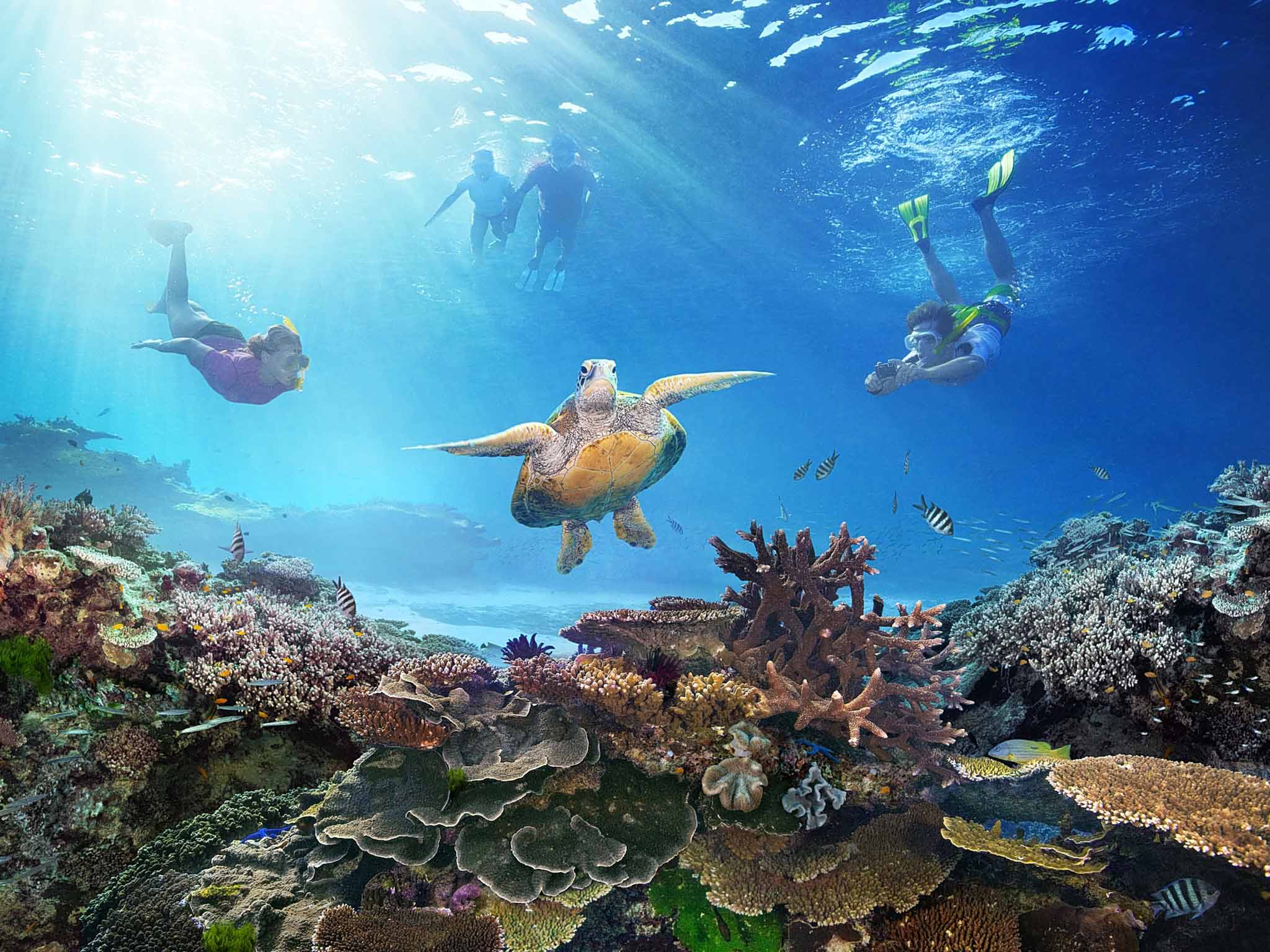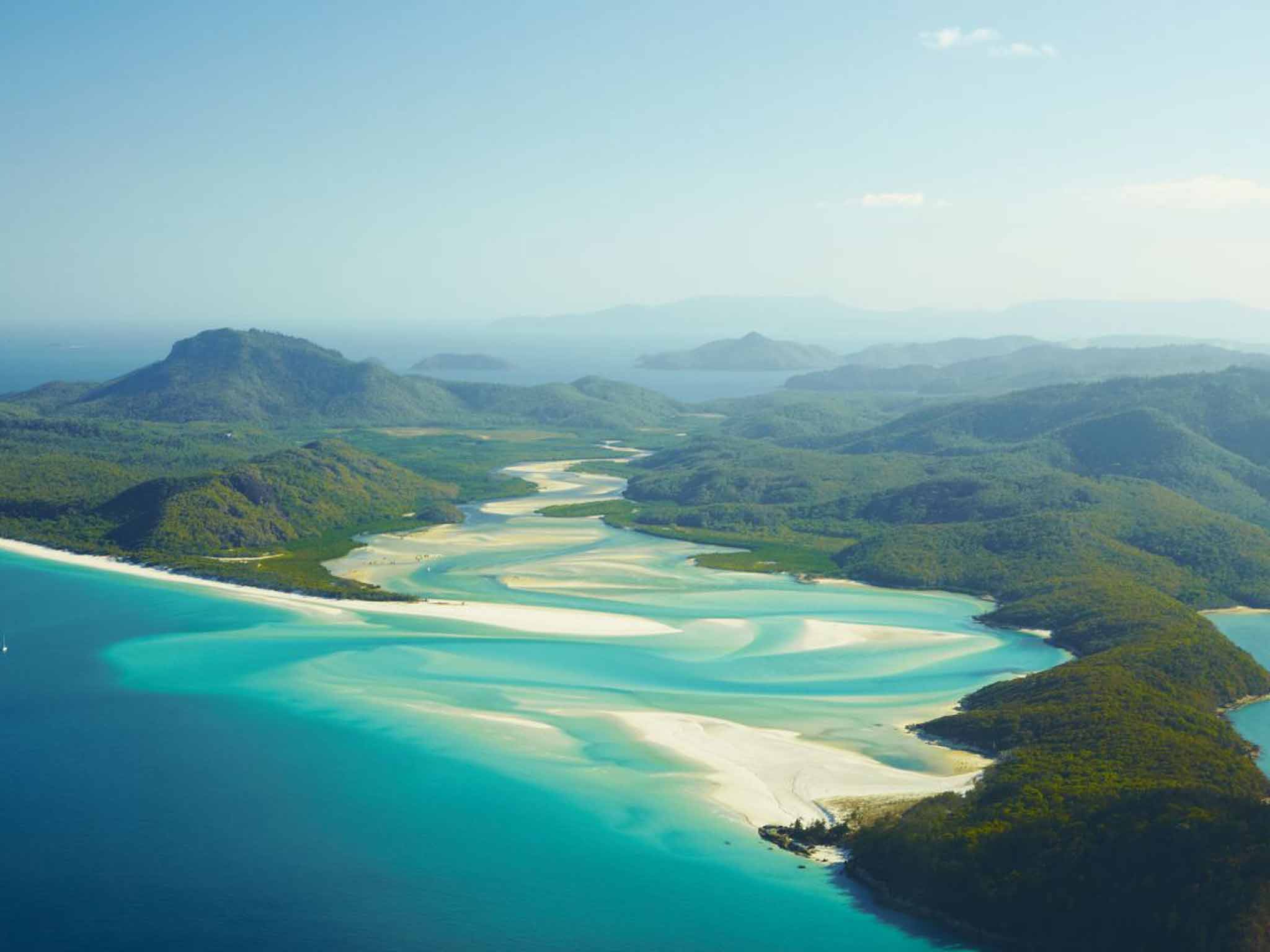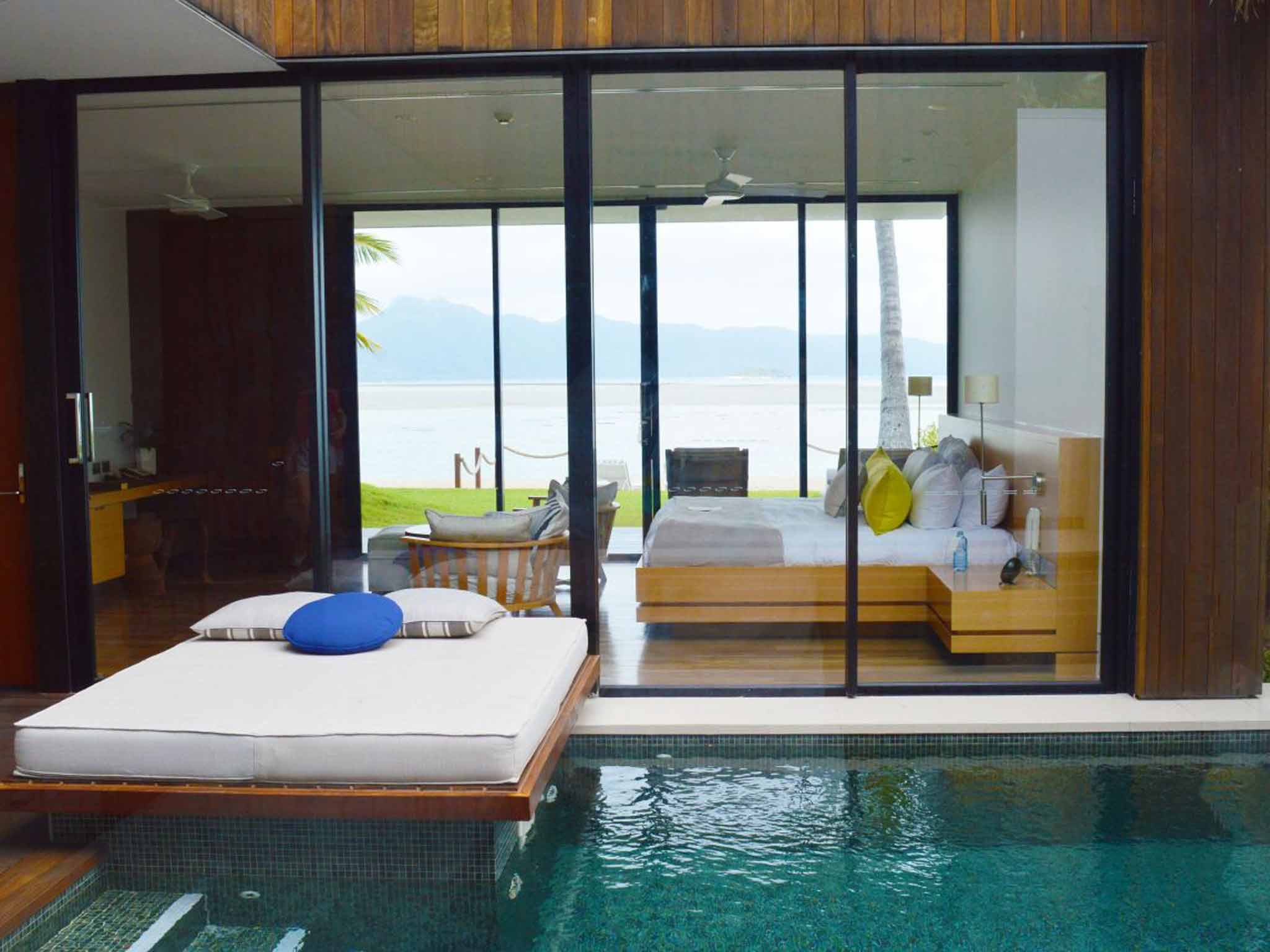The Independent's journalism is supported by our readers. When you purchase through links on our site, we may earn commission.
The Great Barrier Reef: David Attenborough returns to the spectacular natural wonder for the BBC
Sian Lewis uncovers the highlights, both under and above the water

Your support helps us to tell the story
From reproductive rights to climate change to Big Tech, The Independent is on the ground when the story is developing. Whether it's investigating the financials of Elon Musk's pro-Trump PAC or producing our latest documentary, 'The A Word', which shines a light on the American women fighting for reproductive rights, we know how important it is to parse out the facts from the messaging.
At such a critical moment in US history, we need reporters on the ground. Your donation allows us to keep sending journalists to speak to both sides of the story.
The Independent is trusted by Americans across the entire political spectrum. And unlike many other quality news outlets, we choose not to lock Americans out of our reporting and analysis with paywalls. We believe quality journalism should be available to everyone, paid for by those who can afford it.
Your support makes all the difference.The Great Barrier Reef is a natural wonder on an epic scale. Living coral forms 3,000 reefs that stretch for 2,300km along the coast of Queensland, making a colourful home for 1,600 species of fish. Here, you'll find 133 types of shark and ray, six kinds of marine turtle, and a thousand paradisical islands. But the figures fall flat compared to the reality of this magical underwater phenomenon.
First experiencing the reef is a little like having the colour saturation turned up on your eyeballs – sea the colour of jasper, brilliant blue skies, white sand and, under the waves, a rainbow of coral, home to everything from glimmering shoals of fish to wizened turtles and waving anenomes.
David Attenborough still describes his first time diving the Great Barrier Reef, in 1957, as “the most magical experience of my life”. He returned to Australia's “rainforest of the ocean” for what is perhaps his most spectacular show to date, a BBC1 documentary that combines the story of his most-loved natural wonder with the latest, cutting-edge video technology to show the weird and wonderful world beneath the waves, now so threatened by pollution, climate change and industry.
The reef may be long but it can only really be accessed from certain points. Cairns is the main jumping-off point, and most tour companies are based here. Party town Airlie Beach is the gateway to the Whitsunday Islands, while more upmarket snorkel cruises and day-long boat excursions leave from Port Douglas. Diving hub Townsville is the place to hop on to a live-aboard dive boat.
The Whitsundays lie less than 50km offshore, and the clear, calm waters surrounding these 74 islands are a popular spot for sailing. The tour companies of Airlie Beach and nearby Shute Harbour offer day-trips or multi-day itineraries that include the chance to snorkel and stop off on the islands' photogenic white-sand beaches. Explore Whitsundays (00 61 7 4946 5932; explorewhitsundays.com) offers a three-day Adventure Sailing cruise from A$529pp (£252) including park fees and a bunk in a dorm-like open-plan cabin. For something a little more private, Queensland Yacht Charters (00 61 7 4946 7400; yachtcharters.com.au) offers yachts sleeping four from A$475 (£227) per night (minimum five nights).
From snorkelling around a wreck to taking off for an aerial view, there are numerous ways to enjoy the Reef. Diving is the classic way to immerse yourself in the cornucopia of colour and beauty below the sea, but there are many other ways of exploring – including Seabobbing, which involves holding on to a motorised float-like device that powers through the water, pulling you behind. For A$216 (£103) per hour guests at One&Only Hayman Island, in the Whitsundays (00 61 2 9308 0500; hayman.oneandonlyresorts.com) can glide through the water with a Seabob, and gaze down at the coral garden below, or dive a little deeper, holding their breath, to get a closer look. Depending on the season, a stinger suit may be necessary to avoid jellyfish stings.
A tailor-made tour is one of the best ways to make the most of the Reef, including the beautiful landscapes and vast array of wildlife above the water. Austravel (0808 159 6609; austravel.com) offers an 11-night Great Barrier Reef holiday from £2,379pp. Accommodation includes hotels on Heron Island, Hayman Island and Hamilton Island, as well as in Airlie Beach. Flights from Gatwick to Brisbane via Dubai, car hire, and all transfers to the islands are also included in the price.
Trailfinders (020 7368 1506; trailfinders.com) has an eight-night Cairns and the Great Barrier Reef fly-drive package from £1,569pp. It includes flights from Heathrow to Cairns, plus car hire, accommodation, two guided tours and some meals.

Take a dive
At the Reef you'll share the water with everything from white-tipped sharks and leatherback turtles to tiny nudibranches. Diving Cairns (00 61 7 4041 7536; divingcairns.com.au) offers live-aboard dive trips that take divers to the deep Coral Sea to spot sharks, or to the Ribbon Reefs, where friendly potato cod will pose for photos. Three days on the Outer Reef cost from A$775 (£378) with meals, transfers from Cairns and 11 dives.
Dive Worldwide's three-week Minke Whales & Mantas trip (01962 302 087; diveworldwide.com) starts in Cairns and ends in Hervey Bay. The highlights are six days' diving from a live-aboard, with the chance to spot dwarf minke whales, and four days' diving off Lady Elliot Island, home to manta rays. From £5,495pp, with hotel accommodation, some meals, flights from London to Cairns (returning from Brisbane) and all transfers.
Sleep out
For a unique way to experience the wild expanse of the reef, try spending the night floating above it. On a “reefsleep” experience, a three-hour boat journey takes you from Airlie Beach out into the ocean beyond the Whitsundays, where you are deposited on to a big, bobbing pontoon – Reefworld (00 61 7 4846 7000; cruisewhitsundays.com), which sits on the edge of the coral, surrounded by seemingly endless sea. Spend the day snorkelling, diving, and taking glass-bottomed boat rides. If you book to stay on the pontoon, you'll have the afternoon and evening to laze away with a handful of other guests after the daytrippers leave.
You spend the night out under a sky that's bright with stars, sleeping in a comfy swag – a cross between a sleeping bag and a tent. A night's stay costs A$425pp (£203), including boat travel and all meals.
Over and above
There's little that feels more adventurous than soaring over the sea in a float plane, and from the air you can spot the Heart Reef, which has become a symbol of the area.
Australia By Seaplane (00 61 7 4972 1940; australiabyseaplane.com.au; from A$215/£103 for half an hour), based at Gladstone airport, offers scenic flights, day trips and island transfers. Climb aboard through the tiny doors (the best seat is next to the pilot, although you'll be under strict orders not to touch any of the controls) and minutes later you'll be soaring over the reef, looking down at tiny, uninhabited islands, sharks, turtles and miles and miles of aquamarine water.
Another option is to travel by chopper. Viator (viator.com) offers a half-day package from £149pp, including a helicopter ride from Cairns to the Outer Reef, lunch, and a boat ride back.

Go wild
Attenborough and his team filmed on Heron Island (00 61 7 4972 9055; heronisland.com). This tiny isle is a wildlife haven, especially for birds, from black noddies to wedge-tailed shearwaters with their fluffy chicks. From October to March they're joined by turtle hatchlings.

You must stay the night to visit Heron, as daytrippers aren't permitted; it's accessibly by boat or seaplane from Gladstone. Rooms start from A$320 (£153), B&B. Get up early and snorkel around the wreck of the HMS Protector, just off the island – it's home to manta rays, sharks and shoals of fish, all easier to spot at first light.
On the mainland coast near Bundaberg is the Mon Repos Turtle Centre (00 61 7 4159 1652; bit.ly/TurtleCentre), a research station offering night trips to watch green, flatback and loggerhead turtles on the beach. All profit from ticket sales (A$12/£6) is put back into conservation work.
By torchlight, the rangers take you to the beach where, from November to January, you'll see mama turtles wriggling their way up to lay eggs in the sand. From January to March you can return to watch the tiny babies push their way out of the sand and down to the water. Only one in 1,000 of the little ones are estimated to survive long enough to return and lay their own eggs.
Where to stay
Looking for luxury? Try the Whitsundays. On Hamilton Island you'll find the private pavilions and infinity pools of ultra-luxe Qualia (qualia.com.au), where doubles cost A$1,050 (£501) B&B a night (minimum two-night stay). Hayman is home to the One&Only Hayman Island Resort. Think private helicopter pad, palm-lined beaches and cockatoos roaming free (00 61 2 9308 0500; hayman.oneandonlyresorts.com). B&B doubles from A$799 (£381).
For accommodation at the other end of the price scale, your best bet is to try the mainland tourist hubs. YHA Australia (yha.com.au) has hostels in Airlie Beach (dorm beds from A$29/£14; private doubles from A$81/£39), and Cairns (dorm beds from A$27/£13; private doubles from A$74/£35).
Getting there
Cairns, the main gateway to the Reef, has no direct flights from the UK. The simplest option is with Cathay Pacific (020 8834 8888; cathaypacific.com) from Heathrow via Hong Kong (the shortest journey time is 22 and a half hours). Brisbane has international connections including Emirates (0344 800 2777; emirates.com) and its partner Qantas (08457 747 767; qantas.co.uk) from six UK airports via Dubai; Etihad (0345 6081225; etihad.com) from Heathrow, Manchester and Edinburgh via Abu Dhabi; and Singapore Airlines (0844 800 2380; singaporeair.com) from Heathrow and Manchester via Singapore.
Getting around
Domestic flights connect the main airports for the reef. Qantas flies from Cairns to Townsville and Hamilton Island, and from Brisbane to Townsville; Regional Express (rex.com.au) flies from Cairns to Townsville; Virgin Australia (0843 104 7777; virginaustralia.com) and Jetstar (00 64 9975 9426; jetstar.com) both fly from Brisbane to Proserpine (also known as Whitsunday Coast airport). International car rental companies are represented at Cairns and Brisbane. Alternatively, Greyhound Australia (greyhound.com.au) offers a one-way coach pass between the two cities, along the Queensland coast, for A$335 (£160). These last six months, with unlimited stops.
More information
The next episode of 'Great Barrier Reef with David Attenborough' is on BBC1 on Wednesday at 9pm
Join our commenting forum
Join thought-provoking conversations, follow other Independent readers and see their replies
Comments